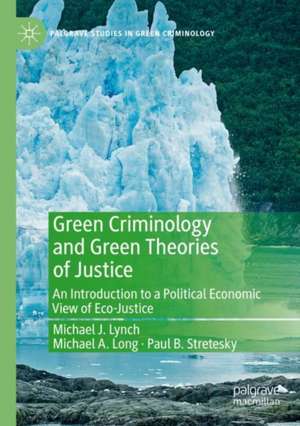Green Criminology and Green Theories of Justice: An Introduction to a Political Economic View of Eco-Justice: Palgrave Studies in Green Criminology
Autor Michael J. Lynch, Michael A. Long, Paul B. Streteskyen Limba Engleză Paperback – 26 aug 2021
This book offers an alternative analysis of the various theories and dimensions of green and environmental justice which are rooted in political economy. Much green criminological literature sidelines political economic theoretical insights and therefore with this work the authors enrich the field by vigorously exploring such perspectives. It engages with a number of studies relevant to a political economic approach to justice in order to make two key arguments: that capitalism has produced profound ecological injustices and that the concept of ecological justice (human and ecological rights) itself needs critiquing. Green Criminology and Green Theories of Justice is a timely text which urges the field to revisit its radical roots in social justice while broadening its disciplinary horizons to include a meaningful analysis of political economy and its role in producing and responding to environmental harm andinjustice.
| Toate formatele și edițiile | Preț | Express |
|---|---|---|
| Paperback (1) | 637.13 lei 6-8 săpt. | |
| Springer International Publishing – 26 aug 2021 | 637.13 lei 6-8 săpt. | |
| Hardback (1) | 642.51 lei 6-8 săpt. | |
| Springer International Publishing – 2 ian 2020 | 642.51 lei 6-8 săpt. |
Din seria Palgrave Studies in Green Criminology
-
 Preț: 319.35 lei
Preț: 319.35 lei -
 Preț: 386.22 lei
Preț: 386.22 lei - 15%
 Preț: 642.18 lei
Preț: 642.18 lei - 18%
 Preț: 782.42 lei
Preț: 782.42 lei - 18%
 Preț: 891.48 lei
Preț: 891.48 lei - 18%
 Preț: 948.79 lei
Preț: 948.79 lei -
 Preț: 451.26 lei
Preț: 451.26 lei - 15%
 Preț: 645.96 lei
Preț: 645.96 lei - 15%
 Preț: 648.24 lei
Preț: 648.24 lei - 18%
 Preț: 894.79 lei
Preț: 894.79 lei - 18%
 Preț: 944.82 lei
Preț: 944.82 lei - 15%
 Preț: 577.72 lei
Preț: 577.72 lei - 18%
 Preț: 888.49 lei
Preț: 888.49 lei - 18%
 Preț: 895.45 lei
Preț: 895.45 lei - 18%
 Preț: 724.00 lei
Preț: 724.00 lei - 18%
 Preț: 949.73 lei
Preț: 949.73 lei - 15%
 Preț: 696.82 lei
Preț: 696.82 lei -
 Preț: 382.75 lei
Preț: 382.75 lei - 18%
 Preț: 945.14 lei
Preț: 945.14 lei
Preț: 637.13 lei
Preț vechi: 749.56 lei
-15% Nou
Puncte Express: 956
Preț estimativ în valută:
121.93€ • 126.83$ • 100.66£
121.93€ • 126.83$ • 100.66£
Carte tipărită la comandă
Livrare economică 15-29 aprilie
Preluare comenzi: 021 569.72.76
Specificații
ISBN-13: 9783030285753
ISBN-10: 3030285758
Pagini: 257
Ilustrații: XI, 257 p.
Dimensiuni: 148 x 210 mm
Greutate: 0.33 kg
Ediția:1st ed. 2019
Editura: Springer International Publishing
Colecția Palgrave Macmillan
Seria Palgrave Studies in Green Criminology
Locul publicării:Cham, Switzerland
ISBN-10: 3030285758
Pagini: 257
Ilustrații: XI, 257 p.
Dimensiuni: 148 x 210 mm
Greutate: 0.33 kg
Ediția:1st ed. 2019
Editura: Springer International Publishing
Colecția Palgrave Macmillan
Seria Palgrave Studies in Green Criminology
Locul publicării:Cham, Switzerland
Cuprins
1: Introduction: Green Theories Of Justice And Political Economy.- 2. Connecting Ecological Decline And Eco-Justice.- 3. Eco-Justice And An Orientation Toward The Ecosystem.- 4. Human Social & Ecological Justice In The Global World: Capitalist System And The Treadmill Of Production.- 5. Unsustainable Economic Development And Nonhuman Ecological Justice.- 6. Gaia And A Green Theory Of Justice.- 7. Metabolic Rift And Eco-Justice.- 8.Political Economy, Food And Eco-Justice.- 9. Conclusion.
Recenzii
“Green Criminology and Green Theories of Justice is an especially useful addition to the growing literature on green criminology. … Summing Up: Highly recommended. Upper-division undergraduates through faculty.” (P. Beirne, Choice, Vol. 57 (11), 2020)
Notă biografică
Michael J. Lynch is Professor in the Department of Criminology and Associated Faculty at The Patel School of Global Sustainability, University of South Florida, USA.
Michael A. Long is Associate Professor in the Department of Sociology, Oklahoma State University, USA.
Paul B. Stretesky is Professor in the Department of Social Sciences at Northumbria University, UK, and Associated Faculty in the Department of Sociology, Colorado State University, USA.
Textul de pe ultima copertă
This book offers an alternative analysis of the various theories and dimensions of green and environmental justice which are rooted in political economy. Much green criminological literature side-lines political economic theoretical insights, and therefore with this this work the authors enrich the field by vigorously exploring such perspectives. It engages with a number of studies relevant to a political economic approach to justice in order to make two key arguments: that capitalism has produced profound ecological injustices and that the concept of ecological justice (human and ecological rights) itself needs critiquing. Green Criminology and Green Theories of Justice is a timely text which urges the field to revisit its radical roots in social justice while broadening its disciplinary horizons to include a meaningful analysis of political economy and its role in producing and responding to environmental harm and injustice.
Caracteristici
Applies the methods of political economy to eco-justice Seeks to broaden the discussions within green criminology Speaks particularly to environmental sociologists, green criminologists, and other criminologists and economists
